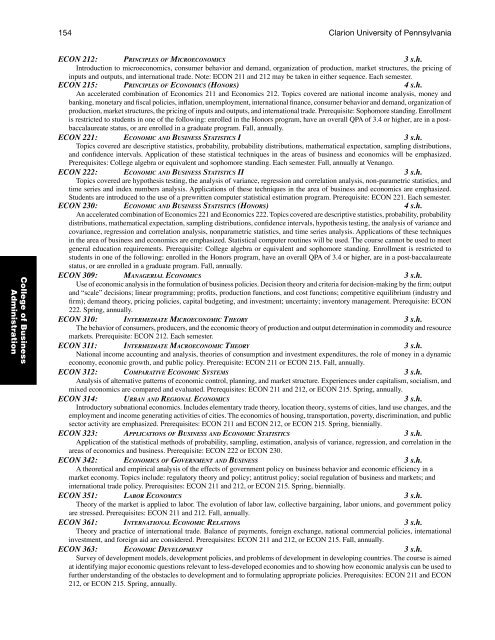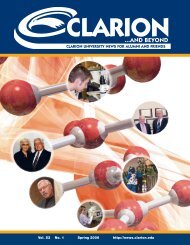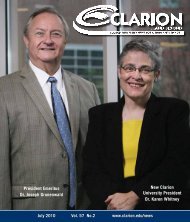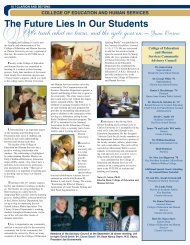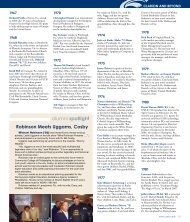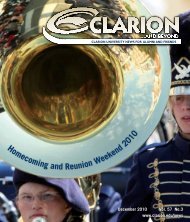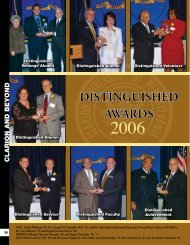Undergraduate - Clarion University
Undergraduate - Clarion University
Undergraduate - Clarion University
- No tags were found...
You also want an ePaper? Increase the reach of your titles
YUMPU automatically turns print PDFs into web optimized ePapers that Google loves.
pages i-viiiCollege of BusinessAdministration154 <strong>Clarion</strong> <strong>University</strong> of PennsylvaniaECON 212: Principles of Microeconomics 3 s.h.Introduction to microeconomics, consumer behavior and demand, organization of production, market structures, the pricing ofinputs and outputs, and international trade. Note: ECON 211 and 212 may be taken in either sequence. Each semester.ECON 215: Principles of Economics (Honors) 4 s.h.An accelerated combination of Economics 211 and Economics 212. Topics covered are national income analysis, money andbanking, monetary and fiscal policies, inflation, unemployment, international finance, consumer behavior and demand, organization ofproduction, market structures, the pricing of inputs and outputs, and international trade. Prerequisite: Sophomore standing. Enrollmentis restricted to students in one of the following: enrolled in the Honors program, have an overall QPA of 3.4 or higher, are in a postbaccalaureatestatus, or are enrolled in a graduate program. Fall, annually.ECON 221: Economic and Business Statistics I 3 s.h.Topics covered are descriptive statistics, probability, probability distributions, mathematical expectation, sampling distributions,and confidence intervals. Application of these statistical techniques in the areas of business and economics will be emphasized.Prerequisites: College algebra or equivalent and sophomore standing. Each semester. Fall, annually at Venango.ECON 222: Economic and Business Statistics II 3 s.h.Topics covered are hypothesis testing, the analysis of variance, regression and correlation analysis, non-parametric statistics, andtime series and index numbers analysis. Applications of these techniques in the area of business and economics are emphasized.Students are introduced to the use of a prewritten computer statistical estimation program. Prerequisite: ECON 221. Each semester.ECON 230: Economic and Business Statistics (Honors) 4 s.h.An accelerated combination of Economics 221 and Economics 222. Topics covered are descriptive statistics, probability, probabilitydistributions, mathematical expectation, sampling distributions, confidence intervals, hypothesis testing, the analysis of variance andcovariance, regression and correlation analysis, nonparametric statistics, and time series analysis. Applications of these techniquesin the area of business and economics are emphasized. Statistical computer routines will be used. The course cannot be used to meetgeneral education requirements. Prerequisite: College algebra or equivalent and sophomore standing. Enrollment is restricted tostudents in one of the following: enrolled in the Honors program, have an overall QPA of 3.4 or higher, are in a post-baccalaureatestatus, or are enrolled in a graduate program. Fall, annually.ECON 309: Managerial Economics 3 s.h.Use of economic analysis in the formulation of business policies. Decision theory and criteria for decision-making by the firm; outputand “scale” decisions; linear programming; profits, production functions, and cost functions; competitive equilibrium (industry andfirm); demand theory, pricing policies, capital budgeting, and investment; uncertainty; inventory management. Prerequisite: ECON222. Spring, annually.ECON 310: Intermediate Microeconomic Theory 3 s.h.The behavior of consumers, producers, and the economic theory of production and output determination in commodity and resourcemarkets. Prerequisite: ECON 212. Each semester.ECON 311: Intermediate Macroeconomic Theory 3 s.h.National income accounting and analysis, theories of consumption and investment expenditures, the role of money in a dynamiceconomy, economic growth, and public policy. Prerequisite: ECON 211 or ECON 215. Fall, annually.ECON 312: Comparative Economic Systems 3 s.h.Analysis of alternative patterns of economic control, planning, and market structure. Experiences under capitalism, socialism, andmixed economics are compared and evaluated. Prerequisites: ECON 211 and 212, or ECON 215. Spring, annually.ECON 314: Urban and Regional Economics 3 s.h.Introductory subnational economics. Includes elementary trade theory, location theory, systems of cities, land use changes, and theemployment and income generating activities of cities. The economics of housing, transportation, poverty, discrimination, and publicsector activity are emphasized. Prerequisites: ECON 211 and ECON 212, or ECON 215. Spring, biennially.ECON 323: Applications of Business and Economic Statistics 3 s.h.Application of the statistical methods of probability, sampling, estimation, analysis of variance, regression, and correlation in theareas of economics and business. Prerequisite: ECON 222 or ECON 230.ECON 342: Economics of Government and Business 3 s.h.A theoretical and empirical analysis of the effects of government policy on business behavior and economic efficiency in amarket economy. Topics include: regulatory theory and policy; antitrust policy; social regulation of business and markets; andinternational trade policy. Prerequisites: ECON 211 and 212, or ECON 215. Spring, biennially.ECON 351: Labor Economics 3 s.h.Theory of the market is applied to labor. The evolution of labor law, collective bargaining, labor unions, and government policyare stressed. Prerequisites: ECON 211 and 212. Fall, annually.ECON 361: International Economic Relations 3 s.h.Theory and practice of international trade. Balance of payments, foreign exchange, national commercial policies, internationalinvestment, and foreign aid are considered. Prerequisites: ECON 211 and 212, or ECON 215. Fall, annually.ECON 363: Economic Development 3 s.h.Survey of development models, development policies, and problems of development in developing countries. The course is aimedat identifying major economic questions relevant to less-developed economies and to showing how economic analysis can be used tofurther understanding of the obstacles to development and to formulating appropriate policies. Prerequisites: ECON 211 and ECON212, or ECON 215. Spring, annually.


